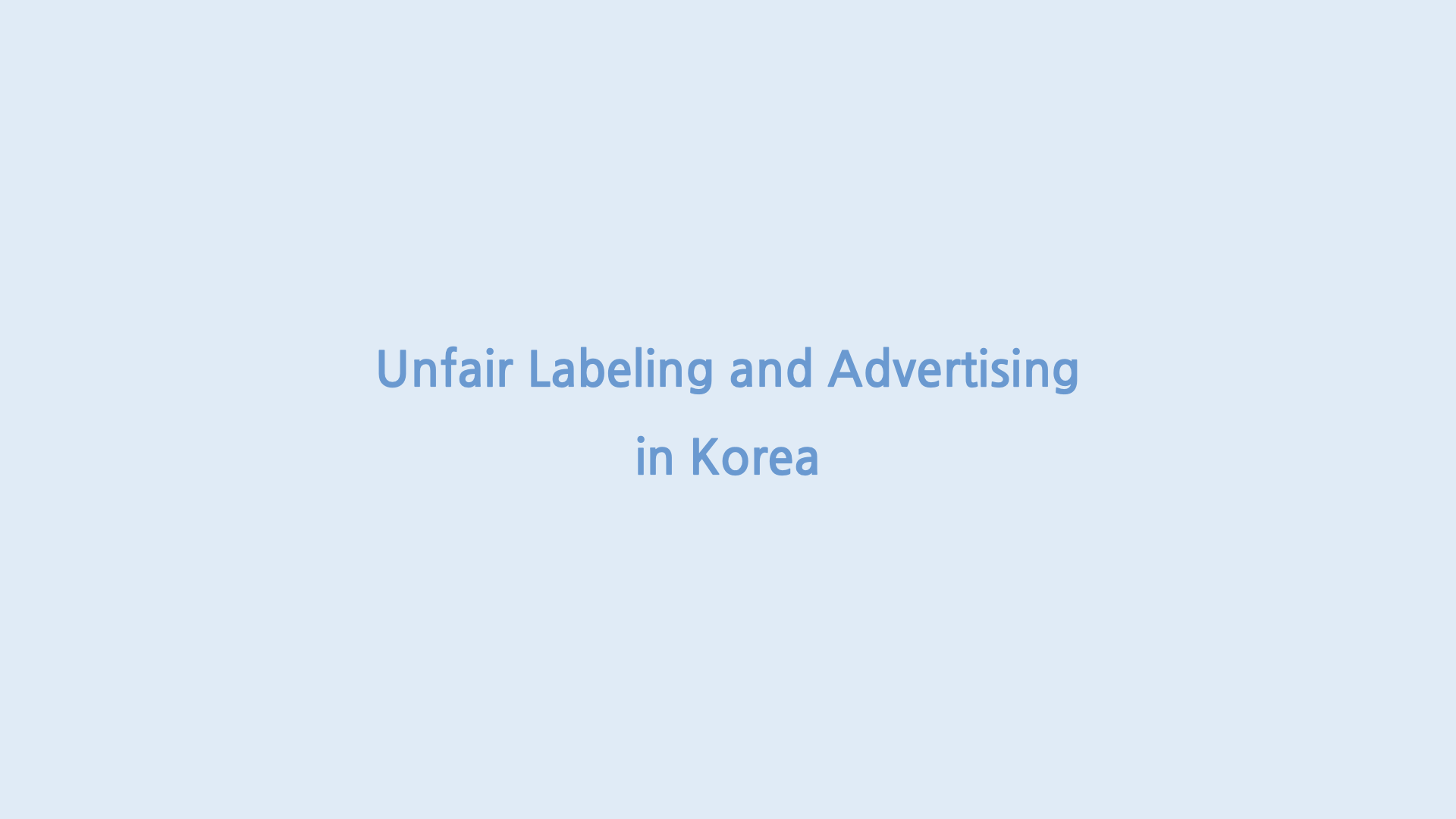I will look over the regulation on unfair labeling and advertising in Korea today.

Attorney David K. Chang
BNL Law
글로벌 통합 법률서비스, 투자, M&A, 법인설립 및 운영, 인사노무, 계약, 기업분쟁 및 소송, 지식재산권, 법무교육
www.bnl.legal
연락처: david@bnl.legal , 010-6836-7578
Overview
The Purpose of the Act on Fair Labeling and Advertising
The purpose of this Act is to prevent unfair labels and advertisements for products and services that deceive or mislead consumers in labeling and advertising, and to promote provision of correct and useful information to consumers, thereby establishing fair trade order and protecting consumers.
The reasons for regulating unfair Labeling and Advertising
An asymmetry in information arises between business entities and consumers, because business entities can obtain not only information about their own products but also various kinds of information, while individual consumers are unable to access adequate information necessary for making wise decisions in terms of economy.
Under such asymmetry, business entities tend to fabricate and exaggerate information which is advantageous to them, and conceal or whitewash information which is disadvantageous to them, providing distorted information, thereby inflicting damage to consumers.
Futhermore, business entities are apt to concentrate on misleading consumers with unfair advertising, rather than fairly competing with one another, only to create a problem of disturbing the operation of market economy.
Prohibition of Unfair Labeling or Advertising
Prohibited unfair labeling or advertising are classified into four types: (1) False or exaggerated labeling or advertising; (2) deceptive labeling or advertising; (3) unfairly comparative labeling or advertising; (4) slanderous labeling or advertising.
False or exaggerated labeling or advertising
Untrue labeling or advertising or excessively exaggerated labeling or advertising (Article 3 (1) 1 of the Act on Fair Labeling and Advertising)
* (e.g.) Labeling or advertising a computer which is not made in Korea as a product made in Korea.
Deceptive labeling or advertising
Concealing or whitewashing any fact in labeling or advertising a commodity or service (Article 3 (1) 2 of the Act on Fair Labeling and Advertising).
* (e.g.) Labeling or advertising that is likely to mislead consumers, such as labeling or advertising a used or defective product as a normal product without any explanation about the condition of the product just to sell the product.
Unfairly comparative labeling or advertising
Labeling or advertising a business entities’ product as better or more advantageous than any other business entities’ product without clearly specifying the standard of such comparison or without any objective ground therefor (Article 3 (1) 3 of the Act on Fair Labeling and Advertising).
* (e.g.) Labeling or advertising the fuel efficiency of a vehicle by comparing the fuel efficiency of a vehicle with a manual transmission with that of a vehicle with an automatic transmission, without providing any information about the compared vehicles.
False or exaggerated labeling or advertising
Untrue labeling or advertising or excessively exaggerated labeling or advertising (Article 3 (1) 1 of the Act on Fair Labeling and Advertising)
* (e.g.) Labeling or advertising a computer which is not made in Korea as a product made in Korea.
Slanderous labeling or advertising
Putting the contents without objective grounds about other business entities or other business entities' products, or only facts unfavorable to other business entities or other entities' products, in a label or advertisement for the purpose of slander (Article 3 (1) 4 of the Act on Fair Labeling and Advertising).
* (e.g.) Advertising that a vehicle supplied by a competitor is not safe on the ground that the data from investigations into traffic accidents show the accident rate of vehicles supplied by the competitor is high, ignoring the fact that there are various causes of traffic accidents.
The ordinance on the determination of the types of, and the criteria for, unfair labeling and advertising was publicly notified to prevent unfair labeling and advertising in advance,and ensure the objectiveness and transparency in the law enforcement against unfair labeling and advertising, by specifying the types of unfair labeling and advertising under the provisions of the Act on Fair Labeling and Advertising and the Enforcement Decree of said Act.
Ordinance and guidelines for labeling and advertising in each business sector: FTC makes ordinances and guidelines for labeling and advertising in each business sector including housing projects, commercial buildings for sale or for lease, environmental facts, financial products offered by banks, insurance products, awards or certifications, mail-order sales, recommendation or guarantee, consumer safety, and internet advertising.
Attorney David K. Chang
david@bnl.legal
More contents https://kunchang.tistory.com/
장건 변호사의 The Road
kunchang.tistory.com
'Road to KOREA' 카테고리의 다른 글
| 거주자와 비거주자 구별 (0) | 2024.03.22 |
|---|---|
| Entertainment Management Business in Korea (1) | 2024.01.29 |
| Online Newspaper Business in Korea (0) | 2024.01.25 |
| Medical personnel in Korean Medical Service Act (2) | 2024.01.24 |
| 외국인 주식 부여 시 주의할 점 (1) | 2023.12.27 |